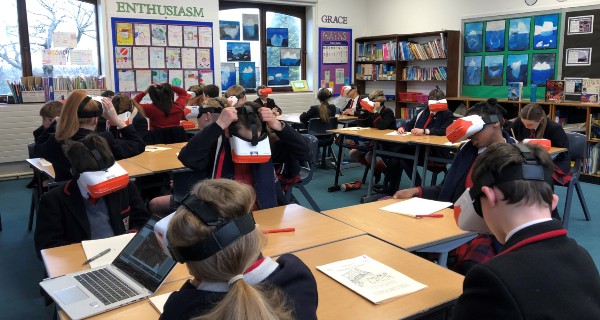We are proud to share that our Head of eLearning, Mr Luxford-Moore, has been recognised on the 2020 Edtech 50 List for his pioneering use of educational technology, listed as one of the 50 people, projects and products shaping the UK's ed tech landscape.
Simon has worked incredibly hard to ensure that technology and its effective use is integrated into teaching and learning rather than standing alone as a separate subject. He has promoted the benefits of technology to enhance teaching and learning across our schools and has now introduced virtual reality across the curricula of both Junior and Senior Schools.
As a result of his efforts, technology is no longer limited to supporting one aspect of visual, auditory or kinaesthetic learning. Virtual reality is enabling us to enhance the learning experience of every child in the school in a truly multi-sensory and immersive approach.
By making learning a more meaningful experience, learners are less hindered by challenges and are more engaged in learning. In Biology lessons most children have to imagine what the inside of a human eye looks like but the children in our classes can use VR to virtually climb into the eye to see how the rods and cones function. Pompeii is no longer a distant and expensive school trip, now that our children can stand on the edge of Vesuvius with lava tantalisingly close. In P3 classes used to study Rainforests using images from textbooks, now they can ‘visit’ them with VR. Simon has even explained the concept of psychosomatics when the children find themselves ‘feeling’ the heat and intense atmosphere of the Amazon.
It goes without saying that the children love the inclusion of VR in the classroom, but it’s not just about making learning more fun. A boy in Primary 3 told us “…with photographs and TV screens I can see things in a rectangle in front of me but with VR I can choose to look wherever I want.” He captured the essence of ownership over his own learning perfectly.
Ultimately the value of education is in the ‘journey’, which you can’t measure on a chart, and the evidence is on the faces of the children; the way they respond and how they talk about their lessons at home because we know that if we have them excited and engaged, the impact will follow. The feedback from children and parents, particularly in relation to the introduction of VR in the classroom, has been fantastic.
This is an exciting time for innovation in the ed tech sector, and we look forward to exploring all that is to come. Congratulations again, Mr Luxford-Moore.
You can read about the Edtech 50 on the TES website here.






